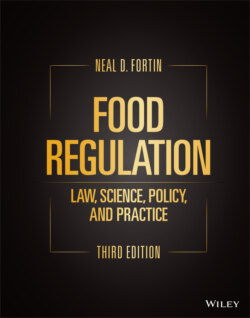Читать книгу Food Regulation - Neal D. Fortin - Страница 293
5.7.2 Substantiation of Dietary Supplement Claims
ОглавлениеThe regulation of dietary supplements is specifically covered in Chapter 11. However, the following guidance document from FDA on substantiation of claims for dietary supplements is included here for comparison with the requirements required to make health claims. In particular, a scientific evidence‐based review is fundamental to the substantiation of both structure/function claims and health claims. The nature of evidence and weight of various types of evidence remain the same across all types of claims. The only distinction is the amount of evidence that is sufficient and whether FDA advance approval is required.
* * * * *
Guidance for Industry Substantiation for Dietary Supplement Claims Made Under Section 403(r)(6) of the Federal Food, Drug, and Cosmetic Act
CFSAN, FDA (December 2008)
… Section 403(r)(6) of the Federal Food, Drug, and Cosmetic Act (the Act) (21 U.S.C. 343(r)(6)) requires that a manufacturer of a dietary supplement making a nutritional deficiency, structure/function, or general well‐being claim have substantiation that the claim is truthful and not misleading.
This guidance document is intended to describe the amount, type, and quality of evidence FDA recommends a manufacturer have to substantiate a claim under section 403(r)(6) of the Act. This guidance document is limited to issues pertaining to substantiation under section 403(r)(6) of the Act; it does not extend to substantiation issues that may exist in other sections of the Act….
The Act, as amended by the Dietary Supplement Health and Education Act of 1994 (DSHEA) and the legislative history accompanying DSHEA do not define “substantiation.” …
Under the Act, FDA has exclusive jurisdiction over the safety, and primary jurisdiction over the labeling, of dietary supplements. The FTC has primary jurisdiction over advertisements for dietary supplements. Given these jurisdictional assignments, we and the FTC share an interest in providing guidance on what “substantiation” means. In April 2001, FTC issued a guidance document entitled, “Dietary Supplements: An Advertising Guide for Industry.”63 Our guidance document is modeled on, and complements, the FTC guidance document….
The FTC has typically applied a substantiation standard of “competent and reliable scientific evidence” to claims about the benefits and safety of dietary supplements and other health‐related products. FDA intends to apply a standard for the substantiation of dietary supplement claims that is consistent with the FTC approach….
The FTC standard of competent and reliable scientific evidence has been defined in FTC case law as “tests, analyses, research, studies, or other evidence based on the expertise of professionals in the relevant area, that has been conducted and evaluated in an objective manner by persons qualified to do so, using procedures generally accepted in the profession to yield accurate and reliable results.”
Although there is no preestablished formula as to how many or what type of studies are needed to substantiate a claim, we, like the FTC, will consider what the accepted norms are in the relevant research fields and consult experts from various disciplines. If there is an existing standard for substantiation developed by a government agency or other authoritative body, we may accord some deference to that standard.
In determining whether the substantiation standard has been met with competent and reliable scientific evidence, we recommend that firms consider the following issues in their assessment:
The meaning of the claim(s) being made;
The relationship of the evidence to the claim;
The quality of the evidence; and
The totality of the evidence… .
The first step in determining what information is needed to substantiate a claim for a dietary supplement is to understand the meaning of the claim and to clearly identify each implied and express claim. When a claim may have more than one reasonable interpretation, we recommend that a firm have substantiation for each interpretation. Consumer testing may be useful to determine consumer understanding of each claim, in context. We recommend that firms not only focus on individual statements or phrases, but also on what expected effect or benefit are being promoted when all of the statements being made for the product are considered together. Although it is important that individual statements be substantiated, it is equally important to substantiate the overall “message” contained when the claims are considered together.
